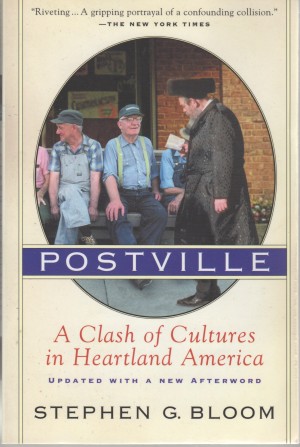
Postville: A Clash of Cultures in Heartland America by Stephen G. Bloom (2000. Harcourt. ISBN 9780156013369)
My mom loaned this book to me because:
1. Though a life-long Episcopalian, she is fascinated by Judaism;
2. She thinks I need to read more (I read about a book a week and “more” is likely an impossible objective); and
3. She knows I am a seeker.
Well, I have to say, though I won’t rave about Postville as many critics did when it was released over a decade ago, I will agree with Henry Kisor of MSNBC who wrote that author Bloom “treats both sides with affection…” Bloom, a secular Jew who had little experience or knowledge of Lubavitcher Judaism, tries to explain the religious gap between the predominantly Lutheran residents of tiny Postville, Iowa (population 1,465), his own tepid faith, and the rigorous, misogynistic, self-centered, and mysterious Hasidic Jews who land in Postville to reopen an abandoned meat processing plant. The success of the Lubavitchers and their commerce is good for main street Postville, bringing jobs and prosperity to a stagnant farm economy hit hard by the Carter years. Bloom, entranced by the sociological experiment inherent in the influx of stringently holy and standoffish New York Jews into a predominantly Christian community, uses his position as a journalism professor at the University of Iowa to interview Postville natives and the invading Lubavitcher clan with an eye to weaving their stories into a cogent, cohesive narrative. In this task, he succeeds.
One can’t help but come away from reading Postville with a sense of transcendent sadness and guilt. The Jewish faith, more than any other branch of monotheism, has endured the greatest purges, horrors, suffering, and discrimination mankind is capable of unleashing. And yet, through it all, the faithful and the fallen alike who identify themselves either religiously or culturally as Jews have managed to survive. It is the otherness of being a Jew, even a nonpracticing Jew like Doc Wolf (a local physician profiled in the book who delivered thousands of Postville-area babies without a single complaint being raised by expectant mothers as to his lack of Christian belief) that Bloom explores when attempting to make inroads into the tightly knit family and social structure of the Lubavitchers. The story hangs together on the twin threads of the Hasidim’s “otherness” defined by their defiance against assimilation (they are the Jews who wear the black clothing, the long ornate beards, and who do not intermingle with gentiles as depicted in New York street scenes in movies) and Bloom’s own sense of “otherness” as a nonpracticing Jew, married to a Jew, trying to raise a son in northeastern Iowa amongst well meaning yet condescending Christians.
The main plot device that the author uses to investigate Postville’s timid acceptance of a kosher meat plant operating just outside the reach of city officials is the city’s attempt to annex the land beneath the plant to gain control over the operation and to profit from assessing city taxes against what had once been an empty building and was coaxed into the economic driving force of the region by the hardline commerce of the Hasidim running the plant. Threats by the Lubavitchers to pack up and leave if the vote for annexation passes do little to strike fear in the residents of the town, though Bloom does explore and explain the divide that the vote caused within the Christian community: the merchants were generally against the plan because they fear the plant will close, taking with it millions of dollars spent in the local economy, while the majority of the gentiles seem bent on exercising municipal power over the non-compliant Jews next door. In the end, its not so much how the vote turned out as the debate and discussion between the factions that makes the plot device integral to the theme of the book, the fact that even within the seemingly unified Christian natives of the area, schisms erupt that lead to hard feelings amongst folks who have been grounded in the soil for generations.
Politics aside, the personal journey of Stephen Bloom, his reaction to the rituals and rules and confines of Hasidic Judaism as practiced in Postville, is the heart and soul of this lively, well written exploration of a little known experiment in social isolation and defiance that, so far as I am aware, continues to play out in Postville to this very day.
4 and 1/2 stars out of 5.


